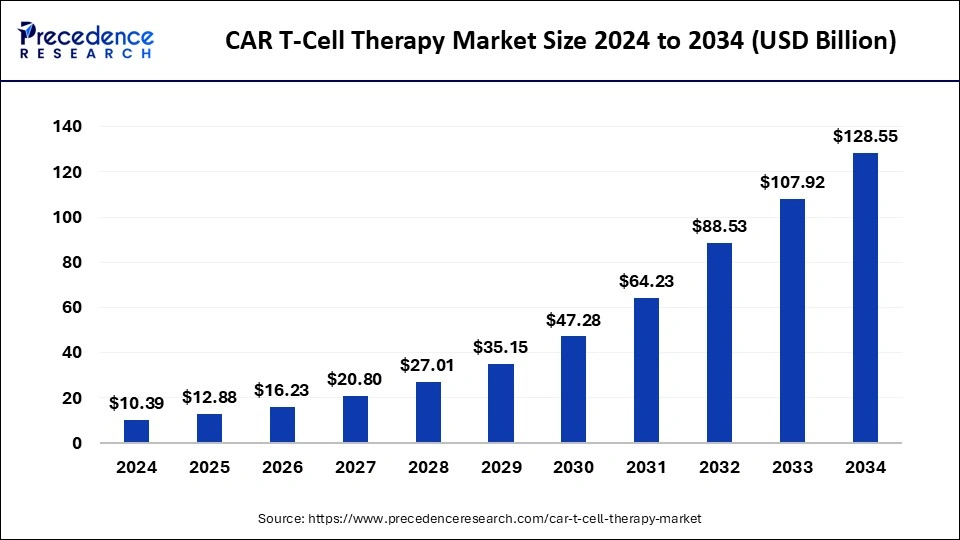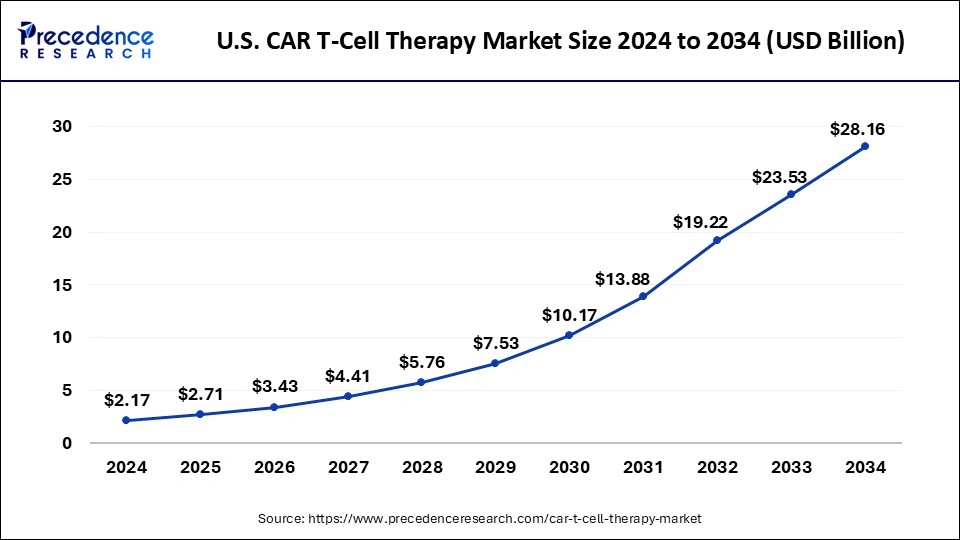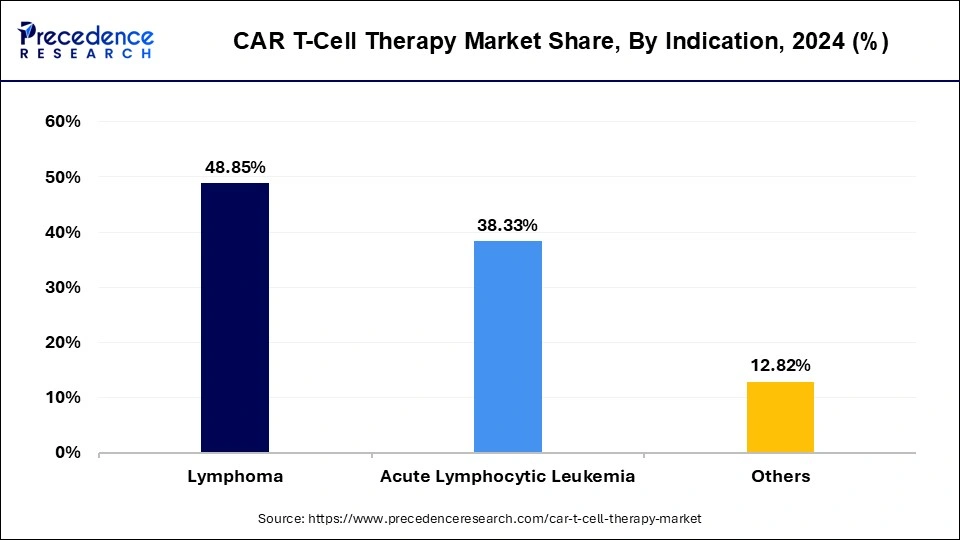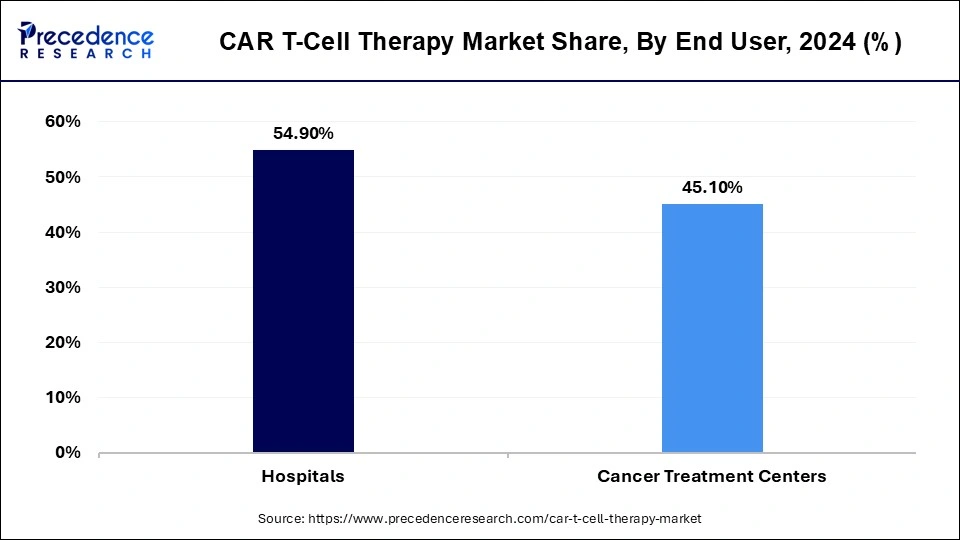October 2024
The global CAR T-cell therapy market size accounted for USD 12.88 billion in 2025 and is forecasted to hit around USD 128.55 billion by 2034, representing a CAGR of 29.10% from 2025 to 2034. The North America market size was estimated at USD 4.14 billion in 2024 and is expanding at a CAGR of 29.20% during the forecast period. The market sizing and forecasts are revenue-based (USD Million/Billion), with 2024 as the base year.
The global CAR T-cell therapy market size was valued at USD 10.39 billion in 2024 and is predicted to increase from USD 12.88 billion in 2025 to approximately USD 128.55 billion by 2034, expanding at a CAGR of 29.10% from 2025 to 2034.

The U.S. CAR T-cell therapy market size was evaluated at USD 2.17 billion in 2024 and is projected to be worth around USD 28.16 billion by 2034, growing at a CAGR of 29.70% from 2025 to 2034.

North America dominated the CAR T-cell therapy market with the largest share in 2024. This is mainly due to the increased investment in cell-based research and development activities. The region boasts well-established healthcare and research facilities, accelerating the rapid development and adoption of CAR T-cell therapy. The U.S. is a major contributor to the market. The country is known as the early adopter of CAR T-cell therapy. The rising approvals for CAR T-cell therapy support market growth. In addition, the rise in the prevalence of blood cancer contributes to market expansion.
CAR T-cell therapy is a type of T-cell therapy or cancer therapy that accounts for approximately 27% of the overall T-cell therapy market. The rising incidence of cancer worldwide is anticipated to propel the development of CAR T-Cells for therapeutic applications. The potential use of synthetic T-cell receptors in treating various cancers has been widely accepted. Chimeric immunoreceptors are becoming more popular because they help T-cells find and kill cancer cells that contain the specific protein to which the receptor can bind.
Research and development in life science and biotechnology for treating cancer using chimeric antigen receptors continue to grow.
In various countries, studies are being conducted to validate the efficacy of CAR T-Cell therapy, which will aid in improving data availability regarding efficacy, mechanism of action, and compliance in patients with leukemia and lymphoma.
| Report Coverage | Details |
| Market Size in 2025 | USD 12.88 Billion |
| Market Size by 2034 | USD 128.55 Billion |
| Growth Rate from 2025 to 2034 | CAGR of 29.10% |
| Base Year | 2024 |
| Forecast Period | 2025 to 2034 |
| Segments Covered | Drug Type, Indication, End User, Region |
| Regions Covered | North America, Europe, Asia-Pacific, Latin America and Middle East & Africa |
Increased prevalence of cancer
The CAR-T cell therapy market is expanding due to increasing patient assistance programs (PAPs), growing government measures to raise cancer awareness, rising cancer prevalence globally, and robust R&D investments from major companies. As the demand for cell-based therapy grows, manufacturers have begun to invest in its development.
An increase in cancer incidence is estimated to fuel the expansion of the global CAR T-Cell treatment market during the projected period. Cancer is the leading cause of death in the world. Most cancer cases are caused by lifestyle factors such as drinking alcohol and smoking and some dietary components such as nitrites and polyaromatic hydrocarbons.
Another primary driver of the requirement for CAR T-Cell therapy products is the robust product pipeline. For instance, AUTO1, an innovative product from Autolus Therapeutics plc, is undergoing a phase I trial to treat adult acute lymphoblastic leukemia. An investigational cell therapy, AUTO1 containing a CD19 CAR T-Cell, is designed to overcome clinical safety and activity limitations associated with existing CD19 CAR T-Cell therapies.
Rising awareness and increase in approval of novel medications.
The development of new technology and increasing awareness regarding CAR-T cells generates "armored CARs" that co-express pro-inflammatory cytokine like IL-12 or IL-15. It increases CAR T-Cell proliferation and persistence at the beginning of tumor-mediated immunosuppression.
Side effects of CAR-T cell therapy
Like all cancer treatments, CAR T-Cell therapies have serious side effects, such as a mass death of antibody-producing B cells and infections. Cytokine release syndrome (CRS) is one of the most common and severe side effects. T cells release chemical messengers (cytokins) which stimulate and direct immune responses as part of immune-related duties.
In the case of CRS, the infused T cells flood the bloodstream with cytokines, resulting in serious side effects such as highly elevated fevers and sudden drops in blood pressure. Severe CRS can be fatal in some cases. Another primary concern with CAR T-Cell therapies is neurologic side effects such as extreme confusion, seizure-like activity, and impaired speech. The exact cause of these neurologic side effects (immune effector cell-associated neurotoxicity syndrome, or ICANS) is unknown.
Based on drug type in the global CAR T-Cell therapy market was dominated by axicabtagene ciloleucel in 2024, and this trend is predicted to continue throughout the coming years. Yescarta is a medication that contains the active ingredient axicabtagene ciloleucel. The need for Yescarta in treating diffuse large B-cell lymphoma and follicular lymphoma is expected to drive segment growth during the estimated period.
In terms of growth rate, tisagenlecleucel is expected to be the fastest segment between 2024 and 2033. An increased need for Kymriah for acute lymphoblastic lymphoma therapy and product approval in various countries drives the segment expansion. It is also approved for adult patients with diffuse large B-cell lymphoma (DLBCL), high-grade B-cell lymphoma, and DLBCL arising from follicular lymphoma.
CAR T-Cell Therapy Market Revenue, By Drug Type, 2022 to 2024 (USD Million)
| Drug Type | 2022 | 2023 | 2024 |
| Axicabtagene Ciloleucel | 1,118.3 | 2,472.3 | 3,046.7 |
| Tisagenlecleucel | 971.1 | 2,143.5 | 2,637.3 |
| Brexucabtagene Autoleucel | 814.8 | 1,808.5 | 2,237.5 |
| Others | 922.8 | 2,020.3 | 2,465.2 |
Based on indication, the worldwide CAR T-Cell therapy industry has been segmented into lymphoma, acute lymphocytic leukemia, chronic lymphocytic leukemia (CLL), multiple myeloma (MM), and others. The lymphoma segment dominates the market and is estimated to grow during the projected period due to an increase in non-Hodgkin lymphoma cases.
According to WHO, approximately 544,352 new non-Hodgkin lymphoma cases were recorded globally in 2020. Furthermore, the growing geriatric population, which is more susceptible to such ailments, is propelling segment growth.

The acute lymphocytic leukemia segment is anticipated to grow the fastest due to increased awareness of CAR-T cell therapeutics for treating acute leukemia and the anticipated introduction of these drugs for treating acute lymphoblastic leukemia involving blood cell cancer testing. Along with this, key factors expected to drive the segment growth are an increase in Acute Lymphoblastic Leukemia (ALL) and initiatives undertaken by public and private organizations.
Technological advancements for detecting affected cells are also regarded as one of the market's growth drivers. For instance, Novartis AG's Chimeric Antigen Receptor (CAR)-T cell therapy is a cutting-edge treatment. This therapy is in phase II clinical trials and is anticipated to be approved by the FDA.
CAR T-Cell Therapy Market Revenue, By Indication, 2022 to 2024 (USD Million)
| Indication | 2022 | 2023 | 2024 |
| Lymphoma | 1,881.0 | 4,137.9 | 5,073.9 |
| Acute Lymphocytic Leukemia | 1,454.4 | 3,223.1 | 3,981.5 |
| Others | 491.6 | 1,083.6 | 1,331.4 |
The global CAR T-Cell therapy market is categorized into cancer treatment centers and hospitals based on end-users. The hospital segment led the market and generated more than 54.90% revenue share in revenue in 2024, and this development is projected to continue during the anticipated period. Hospitalization for cancer therapy is expected to drive hospital growth. The increased application of CAR T-Cell therapy in cancer treatment also promotes the segment's large market share. The segment is being accelerated by an increased number of cancer patients seeking treatment in hospitals.

The cancer treatment center segment is anticipated to witness the highest CAGR during the predicted period due to the availability of an extensive range of treatment choices and the rise in cancer centers in some developing countries. The growing global oncology burden caused by increased alcohol and tobacco consumption propels the segment forward. In the report GLOBOCAN, the International Agency for Research on Cancer (IARC) stated that approximately 19.3 million new cancer cases and about 10 million cancer-related deaths were recorded globally in 2020.
CAR T-Cell Therapy Market Revenue, By End User, 2022 to 2024 (USD Million)
| Indication | 2022 | 2023 | 2024 |
| Hospitals | 2,076.4 | 4,608.8 | 5,702.2 |
| Cancer Treatment Centers | 1,750.6 | 3,835.8 | 4,684.6 |
By Drug Type
By Indication
By End User
By Geography
For inquiries regarding discounts, bulk purchases, or customization requests, please contact us at sales@precedenceresearch.com
No cookie-cutter, only authentic analysis – take the 1st step to become a Precedence Research client
October 2024
February 2025
February 2025
February 2025